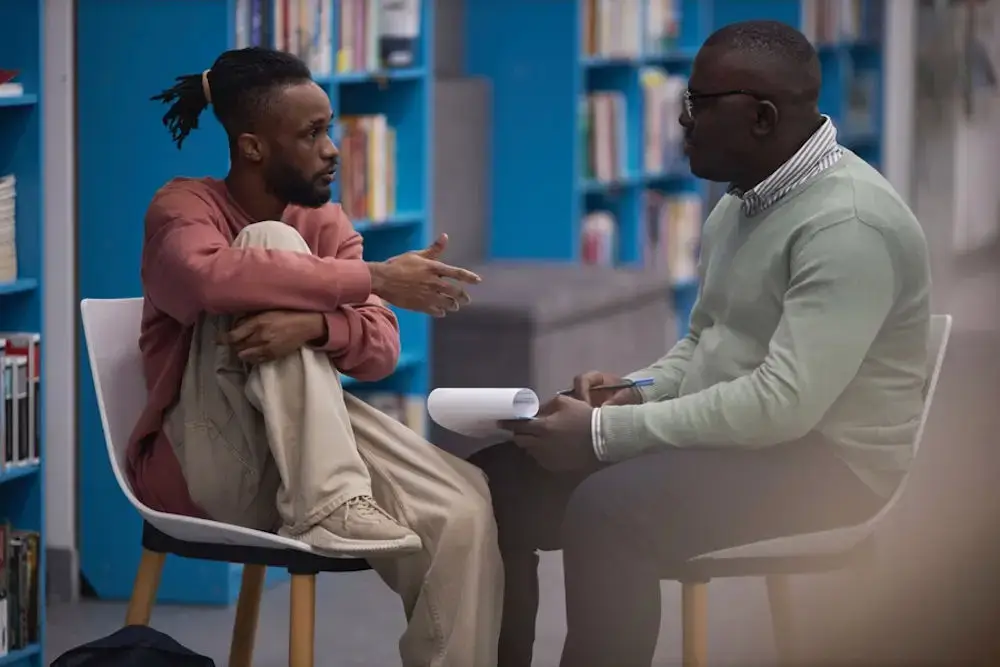Addiction can feel like a storm that disrupts every aspect of life — your health, relationships, work, and sense of self. For many, therapy becomes the anchor in that storm, offering a safe space to untangle the emotional, mental, and behavioral patterns that fuel substance use.
While detox and medical treatment are critical for stabilizing the body, recovery also requires healing the mind. At First City Recovery Center in Kokomo, Indiana, we believe that therapy is one of the most powerful tools available for people seeking freedom from addiction. It’s not just about quitting a substance — it’s about understanding why you turned to it in the first place and learning new ways to live without it.
In the sections below, we’ll explore how therapy works, the different approaches available, and why it’s such an effective pathway toward lasting recovery.
Therapy Is a Proven and Effective Tool in Treating Addiction
Addiction is often misunderstood as a matter of willpower, but research consistently shows it’s a complex brain disease influenced by biological, psychological, and social factors. Therapy addresses all three, making it a proven and effective part of treatment.
Through evidence-based methods like Cognitive Behavioral Therapy (CBT) and Dialectical Behavior Therapy (DBT), therapy helps individuals uncover the underlying causes of their addiction. It’s also a safe environment to talk openly about experiences that may feel too overwhelming or shameful to share elsewhere.
At First City Recovery Center, therapy is integrated into every stage of treatment — from the first days of detox to aftercare programs like our Visible Recovery community. Our therapists don’t just focus on stopping substance use; they focus on helping you build a foundation for a healthier, more fulfilling life.
What Is Addiction and How Does It Develop?
 Addiction, or substance use disorder, develops gradually and often silently. What starts as occasional use — maybe for fun, stress relief, or self-medication — can evolve into dependence and compulsive use.
Addiction, or substance use disorder, develops gradually and often silently. What starts as occasional use — maybe for fun, stress relief, or self-medication — can evolve into dependence and compulsive use.
Several key factors contribute to this progression:
- Genetic predisposition: If addiction runs in your family, your risk is higher.
- Environmental influences: Growing up in a household or community where drug or alcohol use is normalized can make it seem like a viable coping strategy.
- Mental health challenges: Anxiety, depression, PTSD, and other disorders often lead to substance use as a form of relief.
- Changes in brain chemistry: Substances alter the brain’s reward pathways, creating cravings that make quitting extremely difficult without help.
Therapy helps you identify how these factors played a role in your own journey. By understanding the why behind your addiction, you can take meaningful steps toward breaking the cycle.
The Role of Therapy in the Addiction Recovery Process
Therapy isn’t just about talking — it’s about transformation. In the recovery process, therapy serves several vital functions:
- Uncovering root causes: Whether it’s unresolved trauma, grief, relationship issues, or untreated mental illness, therapy helps you identify the issues fueling substance use.
- Developing healthier coping mechanisms: Instead of turning to drugs or alcohol when life gets stressful, you’ll learn practical skills for managing emotions and challenges.
- Rebuilding self-esteem: Addiction can erode confidence and self-worth. Therapy helps you rediscover your strengths and sense of purpose.
- Creating a relapse prevention plan: You’ll work with your therapist to identify triggers and design strategies to navigate them successfully.
At First City Recovery Center, therapy is woven into every treatment level — medical detox, inpatient rehab, outpatient care, and transitional living — ensuring you’re supported at each step.
Types of Therapy Commonly Used for Addiction Treatment
Because every person’s experience with addiction is unique, treatment must be equally personalized. At First City Recovery Center, we offer a variety of therapy types, including:
- Cognitive Behavioral Therapy (CBT): Focuses on changing negative thought patterns.
- Dialectical Behavior Therapy (DBT): Teaches emotional regulation and mindfulness.
- Motivational Interviewing (MI): Strengthens your commitment to change.
- Trauma-informed therapy: Addresses the impact of past traumatic experiences.
- Group therapy: Builds connection and peer support.
- Family therapy: Helps repair and strengthen relationships.
- Holistic approaches: Mindfulness, meditation, and other stress-reduction techniques.
By blending these methods, we can tailor treatment to your individual needs and recovery goals.
How Cognitive Behavioral Therapy (CBT) Helps with Addiction
CBT is one of the most researched and widely used therapies for addiction — and for good reason. It helps you understand the connection between your thoughts, feelings, and behaviors so that you can replace harmful patterns with healthier ones.
For example, if you think, “I can’t handle stress without using,” CBT helps you challenge and replace that belief with something more empowering, like, “I have tools to manage stress in healthy ways.” Over time, these shifts create lasting behavioral change.
At First City Recovery Center, CBT is a cornerstone of our approach because it’s practical, goal-oriented, and effective for both substance use and co-occurring mental health conditions.
The Benefits of Dialectical Behavior Therapy (DBT) in Addiction Recovery
DBT combines cognitive-behavioral techniques with mindfulness practices. It’s especially effective for people who struggle with intense emotions, self-destructive behaviors, or impulsivity.
DBT teaches four core skills:
- Mindfulness: Staying present and aware of your thoughts and feelings.
- Distress tolerance: Getting through crises without turning to substances.
- Emotional regulation: Managing mood swings and intense feelings.
- Interpersonal effectiveness: Communicating clearly and setting boundaries.
These skills give you the ability to face difficult moments without returning to old patterns.
Individual vs. Group Therapy: Which Is More Effective?
The truth is that both have unique benefits — and together, they create a balanced recovery plan.
- Individual therapy offers privacy and deep, personalized work. It’s where you can explore sensitive topics like trauma or guilt without worrying about others’ reactions.
- Group therapy builds community, accountability, and hope. Hearing others share similar struggles can make you feel less alone and inspire you to keep going.
At First City Recovery Center, clients engage in both formats so they can benefit from private insight and shared experience.
The Importance of Addressing Co-Occurring Mental Health Disorders
Nearly half of people with substance use disorders also have at least one mental health condition. If depression, anxiety, PTSD, or bipolar disorder go untreated, recovery becomes much harder to maintain.
Our dual diagnosis program treats both conditions together, ensuring that mental health symptoms are managed while also working on sobriety. This integrated approach significantly reduces the risk of relapse and helps clients feel more stable and supported.
How Therapy Helps Identify Triggers and Prevent Relapse
Relapse doesn’t happen overnight — it’s usually the result of small triggers building over time. Therapy helps you:
- Recognize early warning signs.
- Understand emotional and environmental triggers.
- Create specific action plans for high-risk situations.
We also use role-playing exercises and scenario planning so you’re prepared to handle challenges outside the treatment center.
Building Coping Skills and Emotional Resilience Through Therapy
Recovery isn’t about never feeling stress again — it’s about knowing how to handle it without turning to substances. In therapy, you’ll practice:
- Deep breathing and mindfulness techniques.
- Healthy conflict resolution.
- Setting boundaries with others.
- Journaling for emotional processing.
- Positive self-talk and self-care routines.
These skills aren’t just for early recovery — they’re tools you’ll carry for life.
Can Therapy Alone Treat Addiction?
 While therapy is incredibly powerful, addiction recovery usually requires a combination of medical, behavioral, and lifestyle interventions. Detox, medication, peer support, and structured living environments all play essential roles.
While therapy is incredibly powerful, addiction recovery usually requires a combination of medical, behavioral, and lifestyle interventions. Detox, medication, peer support, and structured living environments all play essential roles.
At First City Recovery Center, we use therapy as part of a larger, individualized treatment plan that addresses the whole person — physically, mentally, and emotionally.
Combining Therapy with Medication-Assisted Treatment (MAT)
For some people, MAT can make a huge difference by reducing cravings and withdrawal symptoms, allowing them to focus more on therapy and personal growth.
When used alongside counseling and behavioral therapies, MAT can improve retention in treatment and increase the likelihood of long-term recovery. Our clinical team carefully evaluates whether MAT is appropriate for each client.
What to Expect During Addiction Therapy Sessions
If therapy feels unfamiliar or intimidating, knowing what to expect can help. In most sessions, you can anticipate:
- A welcoming environment: Your therapist is there to listen without judgment.
- Goal-setting: Together, you’ll outline what you want to achieve.
- Skill-building activities: You’ll learn and practice tools for coping with triggers, cravings, and stress.
- Reflection assignments: Some sessions may include exercises to try between appointments.
- Progress check-ins: You and your therapist will celebrate successes and adjust strategies as needed.
Therapy is a collaborative process — your voice, needs, and goals are central to every session.
Start Your Recovery Journey at First City Recovery Center
Therapy is more than just conversation — it’s a life-changing process that helps you understand yourself, heal past wounds, and build a future free from addiction.
At First City Recovery Center, we offer comprehensive care that combines therapy, medical support, and community connection. Whether you’re starting with detox, entering inpatient care, transitioning to outpatient treatment, or joining our Visible Recovery community, we’ll walk with you every step of the way.
Your freedom is within reach. Contact us to connect with our compassionate team and take the first step toward the life you deserve.
















